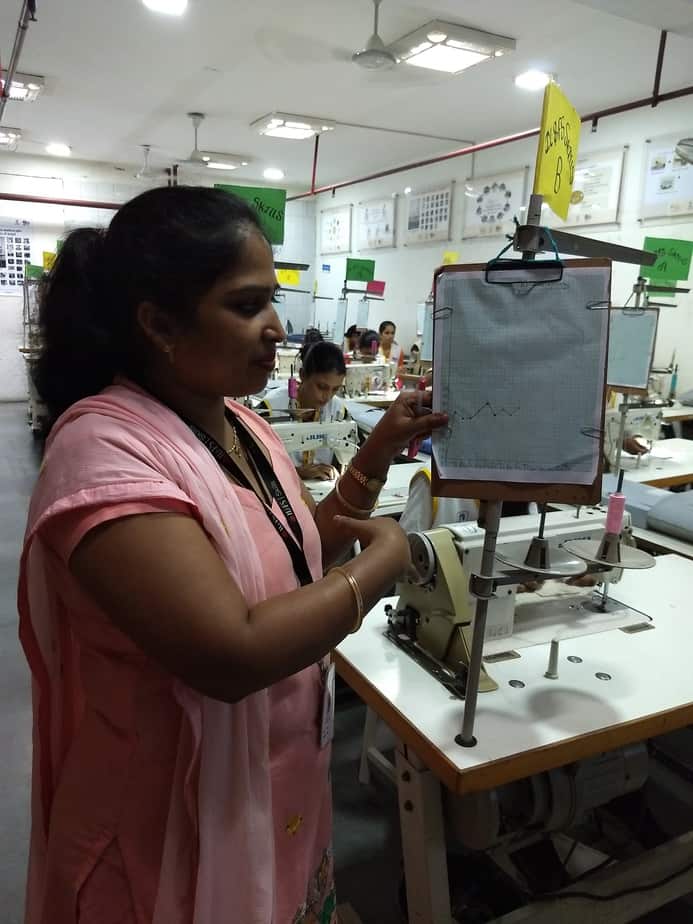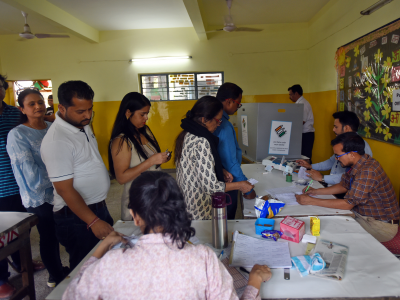Trainers at a skills institute in South Delhi are transforming the lives of several students by grooming them to join the workforce
“Please stop talking. I think I will have to change your seats again.”
The most common warning given by school teachers in all classrooms since ages. It’s quite the same in the skill training centre at Okhla, except that the students are either school dropouts, older than the teachers, or married and are here for only 45 days.
With cards, handwritten notes, flowers and cakes, the students celebrate Teachers’ Day much like any other ordinary school. The teachers, or trainers as call themselves, join in the celebrations at the IL&FS Institute of Skills, a skill development centre that focuses on capacitating students for employment.

The centre falls under the flagship scheme of Pradhan Mantri Kaushal Vikas Yojana, that launched the Skills India programme, that aims to train over 40 crore people in different skills. With around 25-30 students per course that runs for 45 days, the course ends with the students getting placements in their respective fields. The candidates have to be 18 years old and above. From welding, retail, bartending, stewardship to sewing, the centre provides 13 courses for the students to select from.
Functionally very different from a regular school, the role of trainers in the centres is also very specialised. While many of them have joined after several years of experiences in the field, some of them are school dropouts themselves.
Vinita, a Sewing Machine Operator trainer, had started working in the garments industry right after school. Not having much technical knowledge of her work, she decided to pursue a diploma course in Apparel Management Technology, following which she took up the role of a trainer. Working at the centre for the past three years, she explains that the teachers here have to go through a process of Training of Trainers to be qualified to deal with the students. “Some might have the experience of teaching but a different set of skills are required to train here. These students are not like other kids. Some are elder to me, some have abusive husbands at home, some are to become the only earning member of the family. Each student requires different kind of attention,” she says.
Recollecting her first few days as a trainer, she remembers being instructed to tone down her voice while interacting with students. “While working in an export houses, your voice should reach to the 40th person in a line. These habits were difficult to let go in the beginning.”

Most of the trainees in her course are girls, and come from villages with very little educational qualification. Stepping out of their villages for the first time, they appear to be mostly apprehensive in the beginning. Vinita remembers one such instance from her second batch. Jyoti was married when she joined the class. She was hesitant and sad in the beginning, and Vinita let her be. However, after a few days, she talked to Jyoti for over an hour during the class, counselling her in the process. By the end of the course Jyoti was completely transformed and later started working with a company in Gurgaon. “The removal of this self-doubt and fear is what makes me proud.”
Once done with the course, the students are tracked for a year. During the monthly tracking process, good feedback from the students is all the validation Vinita needs.
“When I enquire about their performance and they reply with a smiley face that their salary has increased, it’s the best moment for me.”
However, training is a lot more difficult because they can’t ask the student to drop out or call up the parent of the student in case a candidate is not performing well. Sometimes the family members are not even aware that the child is pursuing the course. “We have to make sure that the students understand. It’s critical that they are fully trained.”

“We have to focus a lot more on the students here. There’s no giving up until they fully comprehend everything,” adds Shakti, a trainer for welding. After completing his class 10, he got enrolled with the Industrial Training Institute (ITI), following which he started working in a steel plant as an apprentice and shifted to two different companies after that. While doing his course in ITI, he longed to be in the seat of the instructor one day and this took him to Chennai, where he completed a Craftsmen Instructor course. After the course, he went back to working in the industry for three years to gain more experience, after which he took up the role of a trainer.
Apart from the regular courses, they also offer soft skills like grooming, personality development and communication skills to prepare students for dealing with customers and employers. Garima Rachel Lyall was a teacher before she joined here as a soft skills trainer. “As a teacher, I would teach my students as per a set pattern. However, here I have to train them as per the capacity of each candidate. I had to change my module and technique accordingly, and change the ways I was adapted to teaching in a school,” she explains.
Dealing with students from all the courses, Garima teaches them the importance of ethics and good behavior, apart from brushing up on their English. “Soft skills cover a motivational aspect as well. I give them examples that they can relate to and make them do role plays which helps them pick up really fast.” Many of the students are adapted to using harsh language and slang while communicating and it’s Garima’s job to teach them how to speak. “There’s a high level of attachment and involvement here with the students. It’s a lot more satisfying,” she adds.
According to all the trainers, the course is a turning point in the lives of their students. “It’s really rewarding that I can change their lives in a few days,” says Bhanupria, a retail trainer. One of her students was married with children when she started her course. She began with a salary of Rs 9,000 which increased to Rs 40,000 within six months. “It is great to see them doing so well and we also witness a huge change in their personality,” she adds.
Every year around 1,800 students pass out from the centre. Thanks to the effort of these trainers, their lives change for the better. “I feel immense pride when we become their idols. ‘Sir, one day I would like to become like you’ — nothing can be more fulfilling than this,” says Gaurav Rana, a hospitality trainer.





